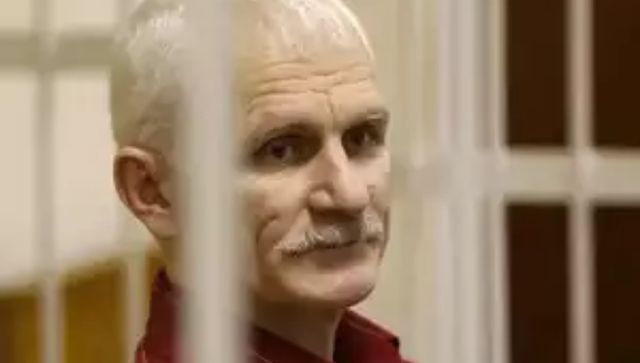A Nobel Peace Prize winner being sentenced to 10 years in prison in Belarus has created an uproar. Ales Bialiatski, a Nobel prize winner and human rights activist, was convicted by a court for funding protests in Belarus. Bialiatski in October won the Nobel prize for promoting human rights and democracy in a country which President Alexander Lukashenko, a staunch ally of Russia, has ruled with an iron hand for nearly 30 years, violently locking up his opponents or forcing them to flee. Let’s take a closer look at Bialiatski: Bialiatski was born on 25 September 1962 in the Russian town of Vyartsilya. As per Britannica, Bialiatski in the 1980s studied literature at university in the Soviet Union In 1986, he cofounded a young writers’ group that pushed Belarusian literature and cultural thought. After Lukashenko became the first president of independent Belarus in 1994 and launched a brutal crackdown, Bialiatski founded human rights group Viasna (Spring) in 1996. As per the Viasna website, Bialiatski is also the former vice-president of the International Federation for Human Rights. In 2011, Bialiatski was jailed for three years for tax evasion, in a move widely seen as politically-motivated in the wake of an earlier presidential election claimed by Lukashenko, who has called himself ‘Europe’s last dicator’. Bialiatski, who was also a Soviet-era dissident, was one of the most prominent of hundreds of Belarusians who were jailed during a crackdown on months of anti-government protests that erupted in the summer of 2020 and continued into 2021. Mass demonstrations took place after Lukashenko was declared the winner of the 2020 presidential election, a result which the Ppposition and Western countries said was fraudulent. More than 35,000 people were arrested, and thousands were beaten by police, in a brutal crackdown he unleashed on the protesters, the largest in the country’s history. Viasna took a leading role in providing legal and financial assistance to those jailed. Bialiatski and three co-defendants were arrested in 2021. They were initially accused of tax evasion and later charged with financing protests and smuggling money. In 2022, Bialiatski was awarded the Nobel Peace Price alongside the Russian rights group Memorial and Ukraine’s Center for Civil Liberties. [caption id=“attachment_11406311” align=“alignnone” width=“640”] Ales Bialiatski won the Nobel Peace Prize in 2022 Image Courtesy: Twitter/@NobelPrize[/caption] Bialiatski thus became just the fourth person in the 121-year history of the Nobel Prizes to receive the award while in prison or detention.
The Nobel Prize website describes Bialiatski as a ‘beacon of light’ for his efforts.
Bialiatski was previously nominated for the Nobel Peace Prize in 2006, 2007, and 2012. He is a laureate of the Andrei Sakharov Freedom Prize. ‘Politically motivated’ Belarusian state news agency Belta confirmed the court had handed down long jail sentences to all the men, including a decade in prison for Bialiatski. The other three men convicted were Valentin Stefanovich, sentenced to nine years, Vladimir Labkovich, who got seven years, and Dmitry Solovyov, who received eight years but was not present in court. Bialiatski denied the charges against him, calling them politically motivated. Bialiatski’s wife Natallia Pinchuk, speaking to BBC, called the verdict cruel and said it was “obviously against human rights defenders for their human rights work”. Nina said that her family had not expected “a miracle” she added “still, this hurts very much. It’s not possible to accept this.” Exiled Belarusian Opposition leader Sviatlana Tsikhanouskaya said Bialiatski and three other activists sentenced in the same trial had been unfairly convicted, and described the verdict as “appalling”.
“We must do everything to fight against this shameful injustice & free them,” she said on Twitter.
“The Minsk regime is fighting civil society with violence and imprisonment. This is as much a daily disgrace as Lukashenko’s support for (Russian President Vladimir) Putin’s war (in Ukraine),” she wrote on Twitter. Berit Reiss-Andersen, leader of the Norwegian Nobel Committee, called Bialiatski’s conviction a politically-motivated “tragedy”. Speaking in an interview in Oslo, he said: “The case, the verdict against him, is a tragedy for him personally. But it also shows that the regime in Belarus does not tolerate freedom of expression and Opposition.” Ravina Shamdasani, spokesperson for the UN High Commissioner for Human Rights, told a briefing in Geneva that the United Nations body was disturbed by the trial and worried by “the lack of fair trial proceedings and access to an independent judiciary in Belarus”. That, she said, placed human rights defenders at risk of criminal prosecution for their legitimate activities. At the end of 2022, there were at least 1,446 people - including 10 children - being held, having faced or still facing criminal proceedings, said Shamdasani, without elaborating. With inputs from agencies
Read all the Latest News , Trending News , Cricket News , Bollywood News , India News and Entertainment News here. Follow us on Facebook, Twitter and Instagram.


)

)
)
)
)
)
)
)
)



